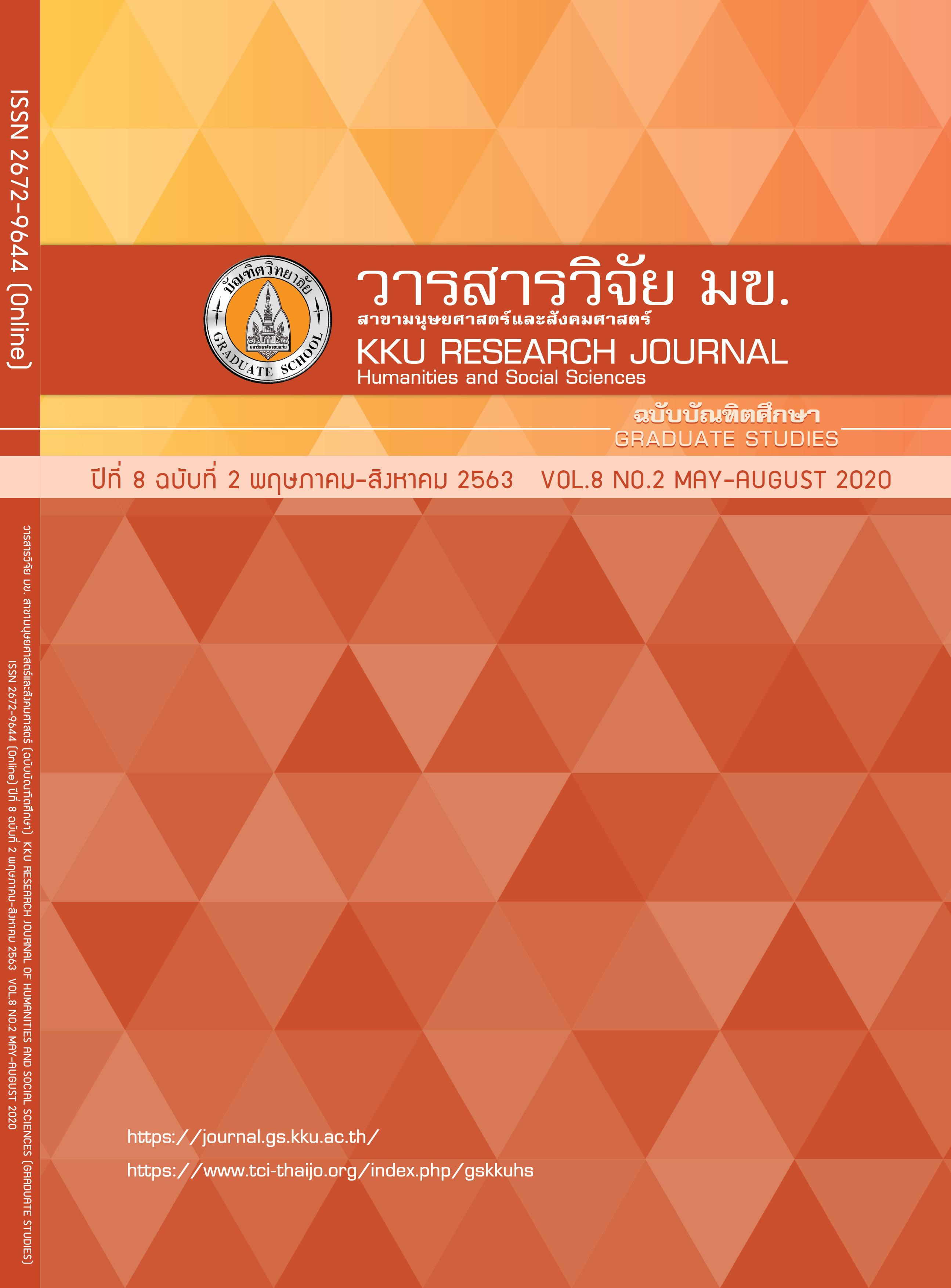การศึกษาเปรียบเทียบโลกทัศน์ด้านคุณธรรม จริยธรรมของคนไทย และคนจีนจากสำนวน
คำสำคัญ:
โลกทัศน์ด้านคุณธรรมจริยธรรม, คนไทยคนจีน, สำนวนบทคัดย่อ
การวิจัยนี้มีวัตถุประสงค์เพื่อศึกษา 1) โลกทัศน์ด้านคุณธรรม จริยธรรมที่ปรากฏในสำนวนไทยและสำนวนจีน 2) เปรียบเทียบโลกทัศน์ ด้านคุณธรรม จริยธรรมของคนไทยและคนจีนที่สะท้อนจากสำนวน การวิจัยนี้เป็นการวิจัยเชิงคุณภาพ โดยเลือกศึกษาเฉพาะสำนวนไทยและสำนวนจีนที่มีความหมายสะท้อนโลกทัศน์เกี่ยวกับคุณธรรม จริยธรรมตามกรอบมาตรฐานคุณวุฒิระดับอุดมศึกษาแห่งชาติ สาขาวิชาภาษาไทย พ.ศ. 2554 ผลการวิจัยพบว่าสำนวนไทยที่สะท้อนโลกทัศน์ด้านคุณธรรม จริยธรรม เรื่องมีทัศนคติที่ดีต่อการทำงานและความรับผิดชอบต่อหน้าที่ปรากฏมากที่สุด มีค่าความถี่ร้อยละ 68 รองลงมาคือคุณธรรม จริยธรรมเรื่องซื่อสัตย์ สุจริต และมีวินัย เคารพและปฏิบัติตามกฎระเบียบ และข้อบังคับและองค์กรและสังคม มีค่าความถี่ร้อยละ 24 คุณธรรม จริยธรรมเรื่องมีจิตสำนึกและพฤติกรรมที่คำนึงถึงประโยชน์ส่วนรวมและสังคมมากกว่าประโยชน์ส่วนตน ปรากฏเป็นลำดับที่ 3 มีค่าความถี่ร้อยละ 6 และคุณธรรม จริยธรรมที่มีค่าความถี่น้อยที่สุดคือ เรื่องภูมิใจในภาษาไทย ความเป็นไทย และมีเจตคติที่ดีต่อวัฒนธรรมไทย คิดเป็นค่าความถี่ร้อยละ 2 ส่วนสำนวนจีนที่สะท้อนโลกทัศน์ด้านคุณธรรม จริยธรรมเรื่องซื่อสัตย์ สุจริต และมีวินัยเคารพและปฏิบัติตามกฎระเบียบและข้อบังคับและองค์กรและสังคมปรากฏมากที่สุด มีค่าความถี่ร้อยละ 35 รองลงมาคือคุณธรรม จริยธรรมเรื่องมีทัศนคติที่ดีต่อการงานและความรับผิดชอบต่อหน้าที่ มีค่าความถี่ร้อยละ 30 คุณธรรม จริยธรรมเรื่องภูมิใจในภาษาจีน ความเป็นจีน และมีเจตคติที่ดีต่อวัฒนธรรมจีนปรากฏเป็นลำดับที่ 3 มีค่าความถี่ร้อยละ 23 และคุณธรรม จริยธรรมเรื่องมีจิตสำนึกและพฤติกรรมที่คำนึงถึงประโยชน์ส่วนรวมและสังคมมากกว่าประโยชน์ส่วนตนนั้นมีค่าความถี่น้อยที่สุด คิดเป็นค่าความถี่ร้อยละ 12 แสดงให้เห็นว่าคนไทยและคนจีนให้ความสำคัญกับคุณธรรม จริยธรรมเรื่องมีทัศนคติที่ดีต่อการทำงานและความรับผิดชอบต่อหน้าที่ และเรื่องซื่อสัตย์ สุจริต และมีวินัย เคารพและปฏิบัติตามกฎระเบียบ และข้อบังคับและองค์กรและสังคมอยู่ในระดับมากเหมือนกัน ส่วนคุณธรรม จริยธรรมเรื่องมีจิตสำนึกและพฤติกรรมที่คำนึงถึงประโยชน์ส่วนรวมและสังคมมากกว่าประโยชน์ส่วนตนและเรื่องภูมิใจในภาษาไทย/จีน ความเป็นไทย/จีน และมีเจตคติที่ดีต่อวัฒนธรรมไทย/จีน อยู่ในระดับที่น้อยเหมือนกัน
เอกสารอ้างอิง
Ma Kan Kluay by Phaiwarin Khaongam. Journal of
Humanities and Social Sciences, PSU. 2008; 4(2): 7-34. Thai.
2. Sosotthikul R. Thai sayings, proverbs and adages that make
comparisons to Animals. Bangkok; Chulalongkorn University Press;
2008. Thai.
3. Tedtong U. Khmer proverbs: ways of life and worldviews of
Khmer people [PhD thesis]. Bangkok: Silpakorn University; 2005.
Thai.
4. Ruiying R. A Comparative Study of Thai idiomatic expression
containing the Word “Hua” with their Chinese equivalents
[MA thesis]. Chonburi: Burapha University; 2004. Thai.
5. Nguyen Thi Dung. Thai idioms and Vietnamese idioms:
a comparative study [MA thesis]. Phitsanulok: University;
2011. Thai.
6. Vu Thi Kim Chi. A Comparative study on Vietnamese and
Thai idiomatic expressions [MA thesis]. Bangkok:
Shrinakharinwirot University; 2007. Thai.
7. Sawettanun K, Kaewduangseang S. Analysis between English
and Asian idioms and proverbs based on Social and Culture
[Research report]. Rajamangala. University of Technology Lanna
Nakonratchasima Province; 2014. Thai.
8. Wichasit N. Analysis of morals in Thai idioms [MA thesis].
Phitsanulok: Naresuan University; 2007. Thai.
9. Tangtienchai W. Chinese idiomatic phrases: structures and
purposes of usage [Research report]. Bangkok: Dhurakij Pundit
University; 2009. Thai.
10. Chaiyapan S. Thai idioms develope language skill for
communication. PNU J. 2010; 2(1). 1-13. Thai.
11. Wong ob-om R. History of China. Bangkok: Torch Press;
2019. Thai.
12. Menghui C. Chengyu da cidian. Beijing: Commercial Press;
2004.
13. Anantawong P. Lon bon tok jean. Bangkok: Mathichon Press;
1996. Thai.
14. Wasinanon N. Chinese art and culture. Bangkok; Sukkhapabjai
Press; 2008. Thai
15. Quan L, Shuhong W, Shujun M. Developing Chinese II. 2nd ed.
Beijing: Beijing Language and Culture University Press; 2014.
16. Prasithrathsint A. Standards of the Thai Language (Volume 4).
Bangkok: Thai Language Institute, Department of Curriculum and
Instruction Development, Ministry of Education; 2009. Thai.
17. Thonglueklit O. The moral and ethics of the students in
the school, Ministry of Education. SWU ejourals. 2018;
13(1): 249-261. Thai.
18. Praneetayasai K. Men sino-chinese family: a case study of
sino-chinese family in Tumbon Mahachai Amphoe Muang Samut
Sakhon Province [MA Thesis]. Silpakorn University; 2001. Thai.
19. Weijie X. The settlement of Chinese-Thais in Thai society as
reflect in Thai novels. Liberal Art Review. 2012; 6(12): 1-12. Thai.
20. Paripunna P. Identity Change: A case study of overseas Chinese
in The novel Lotlaimangkon [MA thesis]. Silpakorn University; 2012. Thai.
21. Tangnirandorn A. The difference between Chinese and Aamrican
children’s tale. [Internet] 2018. [update 2018 Jan 25; cited 2019 Jul 28].
Available from: https://www.bangkokbiznews.com/blog/detail/643733. Thai.
22. Maneesai C. The historical study of Suphasit Phraruang. Journal of
Humanities and Social Sciences, SRU. 2011; 3(2): 129-146. Thai.
23. Ong-karn S. “D&G” The effect from chopsticks advertisement
[Internet] 2018. [update 2018 Nov 26; cited 2019 Jul 28]. Available from:
https://mgronline.com/daily/detail/9610000117938. Thai.
24. Burger King apologizes for intensive chopsticks advertisement
[Internet] 2019. [update 2018 Apr 10; cited 2019 Jul 28]Available from:
https://mgronline.com/china/detail/9620000035276. Thai.
25. Mahatdhanobol V. My point of view on China has been changed
[Internet]. 2012. [update 2012 Apr 11; cited 2018 Jul 28].
Available from: http://www.vijaichina.com/interviews/91. Thai.
26. Thanajirawat Z. The comparative study of cultural reflection from
Thai, Chinese and English proverbs. KKU Res J. 2016; 5(1): 59-82. Thai.
27. Sukumalapong J. The trend of corruption in Thailand [Internet].
2013. [update 2013 Sep 1; cited 2018 Jul 1]. Available from:
https://www.parliament.go.th/ewtadmin/ewt/elaw_parcy/ewt_dl_
link.php?nid=148430. Thai.
28. Panmawanit K. Preservation of Thai cultural identity [Internet].
2016. [update 2016 Jan 12; cited 2018 Jul 28]. Available from:
https://www.m-culture.go.th/young/ewt_news.php?nid=165&
filename=index. Thai.
29. The worrying about the ritual and traditional destruction of
the new generation Chinese teenagers: the government orders
schools to teach students etiquettes [Internet] 2011. [update 2011
Jan 25; cited 2019 Jul 28]. Available from: https://mgronline.com/
china/detail/9540000010116. Thai.




